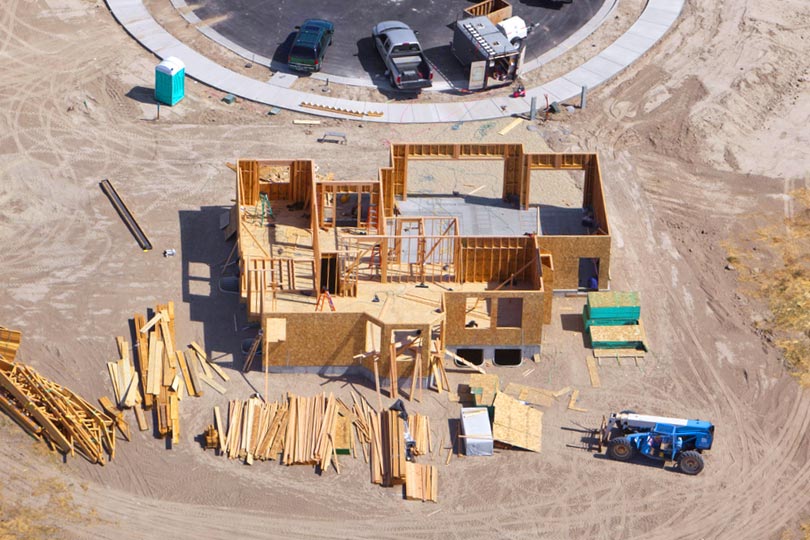More Reasons Why Construction Loans Are Unique

Construction loans, on the other hand, are time-consuming, tend to cost more, and there are delays in moving in until the construction phase is complete and any required inspections have happened.
But these are the most basic differences. Borrowers who are worried about expenses such as the down payment and closing costs likely do well to consider buying an existing home rather than building.
But those who have larger cash reserves, who don’t mind waiting a while until construction is finished, and who don’t need down payment assistance may do well to build a home.
Third Parties
Construction loans differ in other ways, too. The most obvious way is how many people are involved in the transaction.
Buying an existing home requires a seller, a lender, and a borrower. But building a home means getting a builder involved, plus any other third parties needed for inspections, ordering materials, etc. You may work as closely with the builder at certain stages of the project as you do with the lender.
When you buy existing construction, the lender won’t ask you for the seller’s pedigree, qualifications, or related issues.
But when you choose a builder for a construction loan there may be a required builder review process that includes having a look at the builder’s insurance, work history, and review of items specific to your project such as the blueprints, construction plan and timeline, etc.
Some Similarities
Some things aren’t as different between existing construction and new construction as you might think. The going advice is to get pre-approved for a loan before you even consider looking at a floor plan or blueprint.
You do not want to go through the process of choosing blueprints, paying for plans and specifications, and related details only to find out that you didn’t qualify for the loan for some reason.
Talk to a lender before you commit to the process-construction loans do require higher FICO scores and have more strict credit requirements overall. Learn the expectations before you start your research--you will not regret it.
Want More Information About One-Time Close Loans?
We have done extensive research on the FHA (Federal Housing Administration) and the VA (Department of Veterans Affairs) One-Time Close Construction loan programs. We have spoken directly to licensed lenders that originate these residential loan types in most states and each company has supplied us with the guidelines for their products.
We can connect you with mortgage loan officers who work for lenders that know the product well and have consistently provided quality service. If you are interested in being contacted by a licensed lender in your area, please send responses to the questions below. All information is treated confidentially.
OneTimeClose.com provides information and connects consumers to qualified One-Time Close lenders to raise awareness about this loan product and to help consumers receive higher quality service. We are not paid for endorsing or recommending the lenders or loan originators and do not otherwise benefit from doing so. Consumers should shop for mortgage services and compare their options before agreeing to proceed.
Please note that investor guidelines for the FHA and VA One-Time Close Construction Program only allow for single-family dwellings (1 unit) – and NOT for multi-family units (no duplexes, triplexes or fourplexes).
In addition, the following homes/building styles are not allowed under these programs: Kit Homes, Barndominiums, Log Cabin Homes, Shipping Container Homes, Stilt Homes, Solar (only) or Wind Powered (only) Homes.
Contact Us: Send Us Your Request – Spam Safe
Please send your email request to [email protected] which authorizes OneTimeClose.com to share your personal information with one mortgage lender licensed in your area to contact you.
1. Send your first and last name, e-mail address, and contact telephone number.
2. Tell us the city and state of the proposed property.
3. Tell us your and/or the Co-borrower’s credit profile: Excellent – (680+), Good - (640-679), Fair – (620-639) or Poor- (Below 620). 620 is the minimum qualifying credit score for this product.
4. Are you or your spouse (Co-borrower) eligible veterans? If either of you is an eligible veteran, down payments as low as $0 may be available up to the maximum amount your debt-to-income ratio per VA will allow – there are no maximum loan amounts as per VA guidelines.
Most lenders will go up to $1,500,000 and review higher loan amounts on a case-by-case basis. If not, the FHA down payment is 3.5% up to the maximum FHA lending limit for your county.
Do you know what's on your credit report?
Learn what your score means.

July 26, 2024The Federal Housing Administration (FHA) offers qualifying borrowers the option to build a home from the ground up using a Single Close FHA Construction Loan. This program, also known as a One-Time Close construction mortgage, allows borrowers to finance the construction of a new home and convert it into a permanent mortgage with just one closing, streamlining the often complex process of building a house.
July 19, 2024VA One-Time Close construction loans help qualifying veterans build homes they will own and occupy once the construction phase is complete. One-time close loans, or construction-to-permanent loans, combine construction and permanent financing into a single closing procedure. VA One-Time Close mortgages have no VA-required down payment or mortgage insurance, making them attractive options for qualifying borrowers.
July 12, 2024When planning a construction loan, you have many options. For example, do you want to buy land with a loan to build the house? Or do you already own a parcel suitable for the construction project? There are many other choices to make with home loans, but some don’t necessarily apply to construction mortgages.








